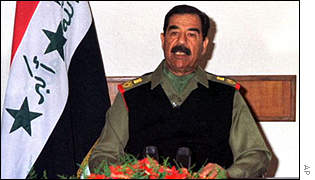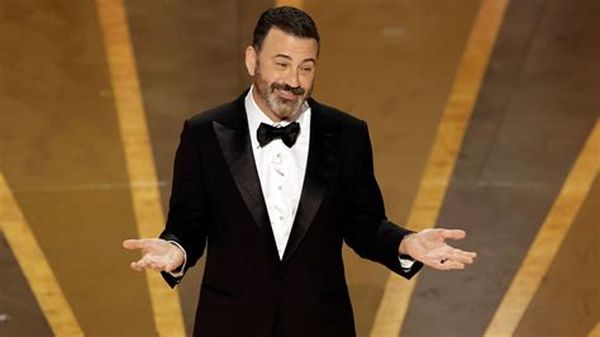Debating Iraq
From the October New CriterionIf the United States goes to war with Iraq it may be the most debated and talked-about war in history. And if there is no war, it will certainly be the most debated and talked-about non-war in history. In the old days, of course, there were probably as many armchair strategists as there are today, but part of the charm of being able to second-guess the generals and the politicians was one’s utter powerlessness to affect their decisions. It was like being a Monday morning quarterback: the quarterback himself operated on a different plane of existence entirely. But nowadays, the second guessers, particularly those in the media, assume an easy equality with those whose behavior they have taken it upon themselves to criticize.
Some people think this a thoroughly good thing. Michael Kinsley, for instance, writes under the heading “Government by Op-Ed” from his own syndicated perch on the Washington Post op-ed page that
“Disarray” is the approved label for the peculiar process by which this nation is deciding whether to go to war against Iraq. Enormous power has been vested in the editors of newspaper op-ed pages, who get to decide which former official of the previous Bush administration will get the next opportunity to remind the world that he is still alive. Bush du Jour lets his people squabble in public. All deplorably chaotic to the orderly minds of foreign policy land. But a better word than disarray might be democracy. In theory, at least, it’s like a high-minded Jeffersonian dream that the national debate about war and peace should be framed by a series of essays penned by former government officials who have withdrawn to their farms, ranches, consulting firms and suchlike contemplative retreats. . .
True, he recognizes that “a bunch of turgid, self-regarding pronunciamientos, full of half-hidden agendas, possibly ghostwritten though hardly by Thomas Jefferson’s ghost, are not exactly the Federalist Papers.” But he doesn’t think this stylistic inadequacy interferes with what, in common with most of those in media land, he considers “the general desirability of vigorous debate.” I’m not so sure. Would not even Jefferson have wished to preserve a pretty sharp distinction between disarray and democracy, particularly when it comes to matters of national security? Does the American version of democracy in any case mean that all citizens have an equal right to take part in such a “debate” concerning high matters of state, in particular whether or not, or when, or how, their country will go to war? Although the most extreme of democrats might argue that they do, even they would presumably have to find some way to make exceptions for malcontents, fifth-columnists, Islamic fundamentalists and so forth.
The well-known words from Burke’s address in 1774 to the electors of Bristol would seem to have some relevance here: “Your representative owes you, not his industry only, but his judgment; and he betrays, instead of serving you, if he sacrifices it to your opinion.” Or, to put it the other way round, if our elected president continues to bring to bear upon the problem of war with Iraq his best judgment — as we must suppose he does — then wherefore all this fever of opinionizing? What have we elected him for, if we are to act as if we expect our views to be treated as being of equal weight with his? Of course we understand what Kinsley means by the “half-hidden agendas” of the first George Bush’s now-retired (or semi-retired) advisers, but he neglects to mention the less-than-half-hidden agenda of the media in rushing with such alacrity to promote them.
That this latter agenda is anti-war — and pro-disarray — we can naturally take for granted, but it remains a matter of some interest just how far the media are willing to go in pursuing it. Would they, for instance, stop short of publishing classified information that might be of assistance to an enemy? The answer, as we discovered with the publication of what purported to be the administration’s actual Iraqi invasion plan by the New York Times last summer, appears to be a resounding no. As the Times itself reported,
Using information provided by a source familiar with the military planning and unhappy with its direction, the Times reported that military leaders envisioned an air-, land- and sea-based campaign against Iraq from the north, south and west. The article listed several countries that might be used as staging areas for the campaign but emphasized that none had been formally consulted about playing such a role and that the planning was preliminary.Defense Secretary Donald H. Rumsfeld, who has often complained about leaks, said in a memorandum to Pentagon officials on Tuesday that unauthorized disclosure of classified information could help terrorists and put American lives in jeopardy. . .
And what does the Times itself say to this grave charge?
A spokesman for the Times said today that while the newspaper could not discuss the nature of its confidential sources, “we are satisfied that the article we printed on July 5 about contingency planning for action on Iraq was consistent with responsible citizenship.We took appropriate steps to determine that while addressing matters of legitimate public concern, we were not jeopardizing current or prospective military operations,” the spokesman said.
Interesting, isn’t it, that the “spokesman” expects us to take on trust that the newspaper “took appropriate steps” to make sure that its disclosure of classified information was responsible — otherwise, why did he not spell out what those steps were, who took them, the evidence he gathered and the reasoning by which he reached his conclusion? — while the whole point of the disclosure was that the paper itself takes nothing on trust from a democratically elected government? If the people’s representatives say that it is dangerous that a piece of information should be made public, there is no question of accepting their claim without independent confirmation, whereas if the unelected and unrepresentative New York Times says that it is not dangerous we are expected to accept that claim implicitly.
But why should it come as any surprise that the media’s self-righteousness reaches its pinnacle of perfection in the nation’s “newspaper of record”? Nor is it surprising that the same newspaper should have waged a months-long campaign against war with Iraq, not only on the editorial and op-ed pages but with the assistance of such bogus “news” stories as James Dao’s solemn assurance that “Experts Warn of High Risk for American Invasion of Iraq.” Just fancy that! You decide to invade somebody and the next thing you know somebody’s telling you there are risks involved. Who’d have thought it? And, warned Mr. Dao, though the experts were varied on their prescriptions for American policy in the region, “there was a broad consensus. . .that if President Bush decided to use military force to remove Mr. Hussein — as many in Congress expect — the Pentagon could not assume that the Iraqi military would collapse without a fight or that Iraqi opposition forces could carry on the fight alone.”
Another surprise! Who — who at the New York Times, anyway — would start a war unless he assumed that the enemy would collapse without a fight? The “report” actually speaks volumes not about the war or the “experts” but about the intellectual culture of the New York Times itself and the kind of vaguely “progressive” and pacifistic views on which it bases its allegedly weighty opinions about matters of war and peace and international relations. Including the Times in that much-ballyhooed “debate” over American policy toward Iraq turns out to be like inviting Noam Chomsky to join the cabinet. There is “disarray” indeed. So much so that “debate” becomes moot. For genuine political debate presupposes the possibility, even the inevitably, of action at the end of it. What the advocates of disarray/Democracy have to offer is paralysis.
But the most remarkable example of the Times’s campaigning under the guise of reporting was its inclusion of Henry Kissinger among the prominent Republicans and former statesmen who, in a story by Todd Purdum and Patrick Tyler headed “Top Republicans Break With Bush on Iraq Strategy,” were supposed to be opposed to what was further supposed were President Bush’s views on war with Iraq. The story was immediately picked up and repeated as the lead of the “NBC Nightly News.” Nearly three weeks later, after it had been pointed out that no such sense could legitimately be derived from the op-ed article in the Washington Post that was said to be the source of this contention, the Times issued a grudging and half-hearted “correction” that essentially repeated the distortion it was said to be correcting.
Although the article “should have made a clearer distinction between [Kissinger’s] views and those of Mr. Scowcroft and other Republicans with more categorical objections to a military attack,” wrote the Times’s anonymous corrector, “Republicans are in fact divided” — as, indeed, they would be, seemingly, if poor Mr Scowcroft were the only one to express any doubts. “Most centrally, Mr. Kissinger said that removing Mr. Hussein from power — Mr. Bush’s justification for war — was not an appropriate goal. He said an attack on Iraq should be directed toward a more limited aim, eradicating weapons of mass destruction.” In fact, not only did Kissinger not say this “most centrally,” he did not say it at all. He said that “the objective of regime change should be subordinated in American declaratory policy to the need to eliminate weapons of mass destruction from Iraq as required by the UN resolutions” — not that it was inappropriate.
Interestingly, the Times had also had to apologize a few days before to the British Foreign Secretary, Jack Straw, for reporting that he had said in a BBC interview that “reinstating United Nations weapons inspectors — not the removal of Saddam Hussein — is the centerpiece of Britain’s policy toward Iraq.” The correction noted that “the assessment that removing Saddam Hussein is ‘not an object of British foreign policy’ was made by the BBC interviewer, not by Mr. Straw.” Could it be that there was a pattern of inaccuracy in reporting the words of public officials, born of the fervent desire on the part of the Times’s editorial staff that as many of them as possible should be anti-war? Or at least anti-Bush.
What was central to Kissinger’s article was the contention that, now that the “ambiguity” of the administration’s attitude towards war with Iraq had brought it to “the point of inviting leaks concerning military planning, congressional debate and allied pressures” — he might have added “internal dissension”! — “the time has come to define a comprehensive policy for America and for the rest of the world.” This, he thought, was the more necessary because of the “revolutionary” nature of the president’s challenge, in his speech at West Point last June, to “the international regimen” which has prevailed since the Treaty of Westphalia “based on the concept of an impermeable nation-state and a limited military technology which generally permitted a nation to run the risk of awaiting an unambiguous challenge.”
This, he said, was no longer the case in a world threatened by stateless terrorist networks. Kissinger agreed with what he said was the president’s belief that “the terrorist threat transcends the nation-state; it derives in large part from the transnational groups that, if they acquire weapons of mass destruction, could inflict catastrophic, even irretrievable, damage. That threat is compounded when these weapons are being built in direct violation of UN resolutions by a ruthless autocrat who sought to annex one of his neighbors and attacked another, with a demonstrated record of hostility toward America and the existing international system.”You have to be a pretty determined ideologue to make those the words of someone who thinks “regime change” is “not an appropriate goal.”
In any case, it was a goal that the Times corrector falsely put in opposition to the destruction of Iraq’s terror weapons, since the one was clearly, both in Kissinger’s article and in administration’s policy, simply the means to the other. “The overthrow of the Iraq regime,” wrote Kissinger, “and, at a minimum, the eradication of its weapons of mass destruction would have potentially beneficent political consequences, as well: the so-called Arab street may conclude that the negative consequences of jihad outweigh any potential benefits. It could encourage a new approach in Syria; strengthen moderate forces in Saudi Arabia; multiply pressures for a democratic evolution in Iran; demonstrate to the Palestinian Authority that America is serious about overcoming corrupt tyrannies; and bring about a better balance in oil policy within OPEC.”
But Howell Raines, the fiercely partisan editor of the Times, thinks it is the conservatives accusing him of bias who are the ideologues, not he and his crack team of objective reporters. “The people who make those kinds of accusations, usually for ideological reasons, are the best witness on why they say that,” he said on the PBS “NewsHour” — as if he still hadn’t the inkling of a clue why such an egregious misrepresentation of the views of a former Secretary of State might give rise to the charge of bias. Ideology, in the terms used by this journalistic élite, is what their critics have, never themselves. It is a sort of superstition, I suppose. Like the Ugandan prophetess Alice Lakwena, Mr Raines believes that once his followers have been anointed with the magic butter of journalistic “professionalism” they become impermeable to the “ideological” bullets of the right.
Nor was it only the journalistic professionals of the Times who showed themselves far less hesitant than the administration when it came to flinging themselves into battle — in their case the battle against battle. Throughout July and August, it was not difficult to discern a six-pronged attack by the media on the prospective war. For weeks alleged news stories appeared purporting to show not only that (1) responsible Republicans like Brent Scowcroft, Dick Armey and, er, Henry Kissinger were against it, but also that
(2) the people, especially ordinary Republicans, were against it. “A lifelong Republican, Tom Meaker worked on Barry Goldwater’s presidential campaign in 1964, served as a Marine officer in Vietnam and now owns a small printing company. His vote helped George W. Bush carry Arizona in 2000,” claimed a heart-tugging story by Michael Janofsky in the Times. “But ask Mr. Meaker about the Bush administration’s not-so-veiled hints of plans to invade Iraq and overthrow Saddam Hussein, and party loyalty evaporates in the afternoon heat.” Also,
(3) the allies were against it. Or, as the headline to a story by Elaine Sciolino in the Times put it “As U.S. Pursues Verbal War on Iraq, the World Voices Concern.” Expressed or implied in such stories was often the charge that, in ignoring these sagacious allies, Bush risked a return to the unilateralism that marred his pre-September 11th presidency. “Many foreign officials,” wrote Glenn Kessler in the Washington Post, “believe the Bush administration, with its unyielding focus on the war on terrorism and the primacy of U.S. interests, increasingly places little stock in the needs and opinions of other nations.” Moreover,
(4) war had not been discussed fully enough in congress and the media — that “debate” again — and the president’s case for war had not been made to either. Mr Raines’s successor on the Times’s editorial page wagged his finger at the President, saying that “it is time for Mr. Bush to level with the nation about his intentions and to talk candidly about why he feels military action against Iraq may soon be necessary, and what the goals, costs and potential consequences of a war would be.” One can only imagine what the Times’s reaction to such candor would be: probably to point out, once again, that
(5) war was a diversion from more important national goals, both domestic and in the war on terrorism and an attempt to seize the agenda from the Democrats in advance of the mid-term elections: “Officers: Iraq Could Drain Terror War,” claimed the Post. Likewise, “Several Republicans said today that the focus on Iraq would serve the political needs of their party going into the close Congressional elections,” wrote Adam Nagourney in the Times. As a result, said Nagourney, Democrats were scurrying to appear more-patriotic than thou. This charge, however, sorted very oddly with the final point of the anti-war case, which was
(6) the inherent risks of the prospective military campaign itself. Michael Janofsky’s appeal to the vox populi went out of its way to note that, though the president remained popular, “popularity comes with an asterisk that could portend huge political risks for an administration convinced that another military action against Iraq is necessary and worthwhile.” But how do these “huge political risks” sort with Adam Nagourney’s assumption elsewhere that war would be such a political sure thing that Bush must be supposed to be contemplating it not for the reasons stated but precisely to gain a political advantage? Not for the first time, we suspect that the Times is less concerned with making its critique of administration policy coherent than with finding any stick to beat the president with.
Besides the political risks, such as they might be, there were also the military risks (a Vietnam-like disaster, a quagmire awaited us, hinted Howell Raines in justifying his policy of questioning administration policy), the economic risks (the war would be costly and further increase the growing deficit) and the diplomatic risks (war would “destabilize” the region and incur the hostility of the whole Arab world). Anyone foolish enough to take the counsel of the media on the matter might suppose that the president must be a fool or a madman even to consider military action against Iraq, so much at a distance do they keep themselves from any arguments for the other side.
But then, the media is up to this contention too, or will be if Bush’s popularity shows signs of slipping. Already Dana Milbank, late of the all-Gore, Al-the-time New Republic and now chief White House correspondent of the Washington Post, has referred to the chief executive of his country as “marionette-in-chief” — his strings being in the hands of that dangerous lunatic of a puppet-master, Bill Kristol. Well, folks, that’s what passes for “debate” — pace Michael Kinsley — in the U.S.A., anno domini 2002. It looks a lot more like disarray to me.
Discover more from James Bowman
Subscribe to get the latest posts to your email.







